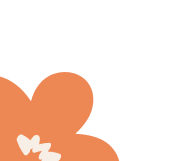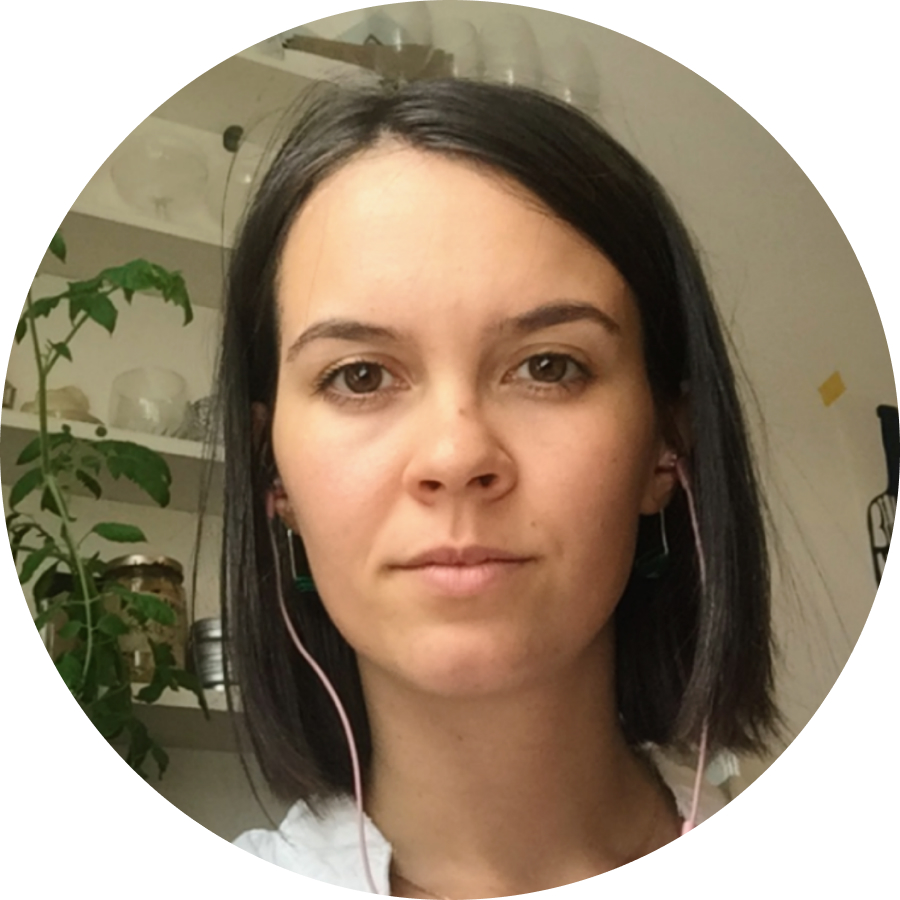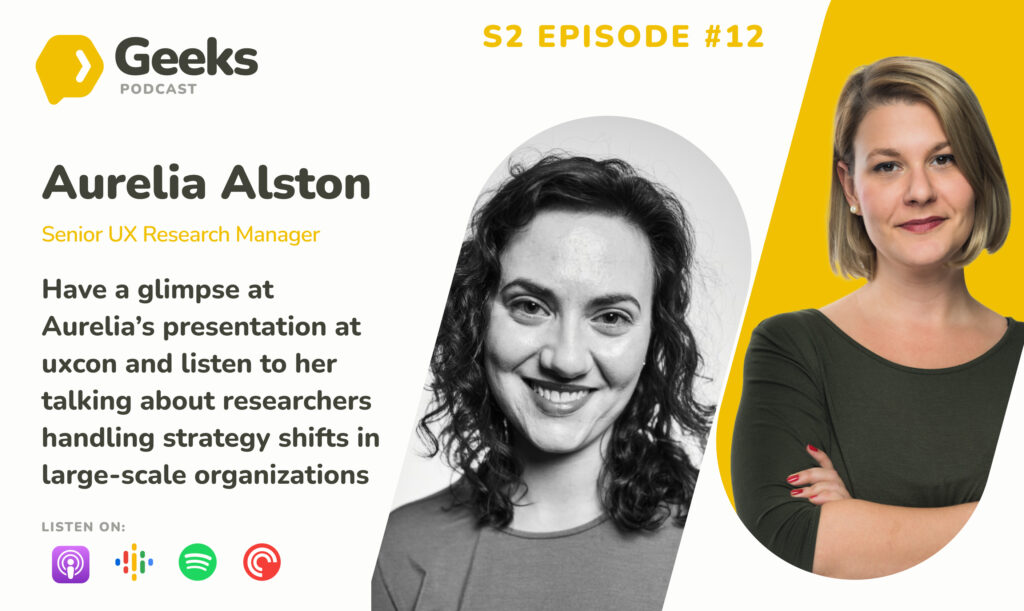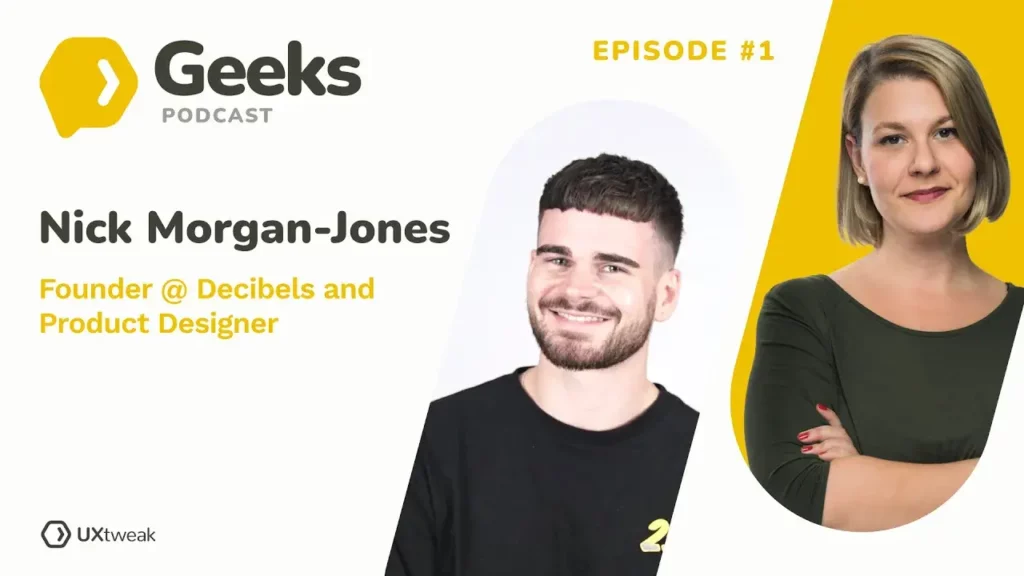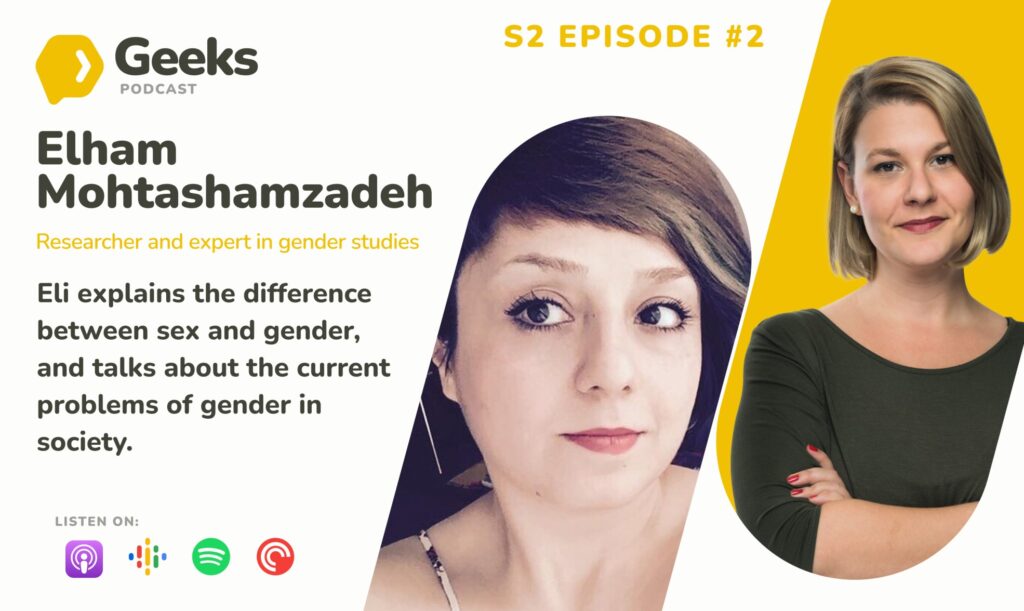Episode highlights
00:05:04 Transitioning from Psychotherapy to Technology
00:12:54 Body Presence in Various Digital Interactions
00:17:57 Testing VR Experiences
00:21:19 Future Visions for UX Research in VR
00:33:08 Closing Thoughts: Ethical Responsibilities in UX Design
About our guest Evie Gavrilovich
Evgenia Gavrilovich is an experienced Market Researcher and Customer/User Experience Strategist with over 7 years in hyper-growth startups. She’s skilled in establishing Research and Customer Support departments, blending psychology with strategic research for optimizing customer relationships. Her past roles include VR UX Researcher at Gravity Sketch, Market Research Consultant at Harry’s Nut Butter, and Founder & Research Consultant at CXentric Tech. Evie excels in enhancing customer satisfaction and retention through user-centric experiences. Her expertise spans comprehensive market research, customer journey insights, and user experience improvements. You can connect with Evie on LinkedIn or visit her website for more information.
Podcast transcript
[00:00:00] Tina Ličková:
Welcome to UX Research Geeks, where we geek out with researchers from all around the world on topics they are passionate about.
I’m your host Tina Ličková, a researcher and a strategist, and this podcast is brought to you by UXtweak, an all-in-one UX research tool.
This is the 18th episode of UX Research Geeks, and we spoke to Evie, who is a user researcher in the space of theor. We spoke about the embodiment. How the body comes to play and how she approaches it and how she’s looking for the meaning that UXR brings to the other stakeholders. So tune in and listen to Evie and her very thoughtful way of living her life.
And a very great question that she’s asking herself.
Hello, Evie.
[00:01:07] Evie Gavrilovich: Hello, Tina. How are you? I’m well. As I told you a little bit earlier, just trying to sit still. So this is a great opportunity to slow down and get into a conversation. So thank you so much for inviting me.
[00:01:23] Tina Ličková: Thank you so much for coming or taking the time. When I was contemplating about what I want to ask you and how do I want to get to know you, the first question is who are you as a person?
[00:01:37] Evie Gavrilovich: Yeah, sure. That is a very only existential question, but I guess maybe to keep it short and to the point I’ll talk a little bit more about like my professional endeavor. So I currently work as a user experience researcher for gravity sketch, which is a design software for sketching and modeling in 3d.
It’s a very interesting piece of technology. I personally find because it’s becoming increasingly popular among car and footwear designers and industrial designers, but also among artists 3d artists metaverse architects, and basically what it allows you to express your spatial ideas. in immersive environment, just by moving your hands in the air and drawing and modeling things in 3D with joysticks.
But before this, I worked in many different fields. I worked for six years in the dating app. Which was very interesting experience, as you can imagine, and it was a very unusual as well. Dating app, it was for unconventional relationship, for polyamorous exploration. So it came with very interesting challenges.
And overall, I worked with humans, with people for over 15 years, across a variety of different industries. And she done many things. Things like setting up a pregnancy massage business some time ago and completing my psychotherapy degree practice in an addiction recovery center and trying to set up a cafe business back in my home country.
So loads of things somehow connected to humans and serving humans and helping humans and building beautiful experiences.
[00:03:35] Tina Ličková: Those are very interesting experiences. And I’m really curious about the defining moments in those experiences which defined your career.
[00:03:46] Evie Gavrilovich: Yes, I think it was, I was always fascinated by humans from very early on.
I was that child who had 3, 000 different questions, but at the same time I was incredibly insecure child and adolescent. And for me, working in hospitality from very early age, I was helping my mom in her cafe, but always hiding away from people, but like quietly observing them the same way, trying to make sense of my own experience, trying to see how people interact with each other.
But I guess the pivotal maybe time for me, the moment for me was going to learn psychology and not only learning by. But practicing it, becoming a counselor, a psychotherapist, and really proactively engaging with human behavior and emotions. And from then on, just by just being in the right place in the right time, I somehow accidentally got into technology.
[00:04:59] Tina Ličková: How did the switch look like or you said ended in technology?
[00:05:04] Evie Gavrilovich: I guess it was just that curiosity that brought me to places that I never anticipated I will end up in. So one time, I guess what it was like maybe seven years ago, I was on Facebook, kind of scrolling through my Facebook feed and I came across this job ad, which was Phrase in a very informal, very casual way.
So the founder of the dating app field, which I was working in the end for six years, back then the idea of the app was in the very early stage of development and the founder was looking for a person who can assist users in a very caring, very human way. And at the time I was working as a receptionist in the holistic center, I was working with a lot of pregnant women and just women who were visiting the center to relax or to do yoga and Reiki and all of this different interesting and holistic practices to look inwards.
And support themselves and within a 15 minute chat, I somehow managed to convince the founder that I’m the right person. And so I got hired on the spot with zero experience in technology and then was slowly making my way. Yeah. I’m just trying to learn about how to set up the support function in the scaling in startup while in parallel, also starting psychotherapy.
[00:06:38] Tina Ličková: And what made you to make this, because I consider it to be also a tough decision, you studied psychotherapy, it’s not exactly an easy study, it takes years to make the decision, okay, I will stick to technology, I will do the user research job.
[00:06:55] Evie Gavrilovich: Yes, psychotherapy program that I’ve done for four years was one of the most challenging things I’ve done in my life.
Have to tell you, it was incredibly rewarding and I was really preparing myself for the career of psychotherapist, but while still working in the app, what happened, I approached the senior leadership and back then the company was still relatively small and I asked, can I. Please try myself in some of the research projects.
So I was still working and running the customer support element, but I just wanted to dip my toes into running some usability testing sessions, speaking to the customers, it came natural to me because for the past four years, what I’ve done, I. I’ve been practicing sitting in the room with people and going very deep down the rabbit hole of their emotions and feelings.
So that was only natural to me. And the people in the app at field were always incredibly supportive. And they said, Please just do it. Don’t worry about anything. Just take it on. And I’ve done a few projects and then it became apparent that I can handle it. I was learning on my feet while doing the handover of some of the customer support responsibilities to another person who were hired.
Applying a lot of experiences from the past. So all the experiences and all the skills from years of working in hospitality, years of working in the wellness industry, and then in psychotherapy came very handy in setting up the support, sorry, setting up the research function in the dating app. So that’s where the switch happened.
[00:08:56] Tina Ličková: Yeah. I’m always interested in the self learners journey because it’s a rocky one, but it’s also super interesting when we were talking about your experiences there for me, two fields where. You also content wise probably have to offer a lot. One is the dating, which you spend their years and it’s the, it’s not the typical dating and I’m showing all the bubbles and then the VR.
If you could maybe tell me what is your fascination in these topics? What is that? What brought you to these topics?
[00:09:31] Evie Gavrilovich: Yeah, again, this is something that I did not anticipate, but I guess this is where my just curiosity brought me to this very unconventional spaces and looking into Human problems that are very unconventional in their nature.
So the dating app was, as I mentioned, specializing in providing this digital space for people to connect with strangers on the very vulnerable, very open minded level to heteronormativity.
It’s incredibly fascinating to break away from the norm and work with the very messy elements, not just the messy element of kind of general user psychology online, but with the messy element of relationship and connecting people in a meaningful and very safe way. And exploring something that’s still in the lots of societies considered to be a taboo.
We were scaling the startup. I was trying to establish the whole operational side of research, but in the meantime, also trying to make sense of how do people explore themselves and how technology can provide you this completely new way of doing it. And when I was finishing my psychotherapy course, I chose to write a thesis on the topic of adolescent sexual development and how technology plays into it and what influence does it have.
And while working on my library research, I came across Some of very interesting, fascinating topics, which is embodiment and embodiment of you as a human, but in the Internet in the digital space. And of course when you access the digital space and cyberspace through your phone or through your computer.
You’re present, right? Your senses are present, but in a way, your body is removed. So you still have the dopamine, you still feel all the emotions of anger and fear and excitement and happiness. And a lot of it is triggered through reward system and dopamine system, but your body is largely not in the picture, if and so when I moved eventually into the VR space, I became… Again, we revisited the idea of embodiment because it’s fascinating because suddenly the body is back on the picture. You’re fully immersed. You have to move in the space. We’ve all seen videos of people wearing VR headsets and running into walls or looking very seemingly scared of something.
that they’re seeing in VR headset and either running away or making noises. So the whole body is involved in that process, in that experience. Sorry, I just made this big detour.
[00:12:44] Tina Ličková: I didn’t stop you because it’s super interesting.
[00:12:49] Evie Gavrilovich: As you can see, I can speak about this like nonstop, but anyway, to keep on the course.
[00:12:54] Tina Ličková: No, it’s super interesting and I would even stick there for a while. This is interesting what you’re stating about the body being there, not being there. With the dating, the context for me is you are judged when it comes to your physical appearance. And in apps like Tinder, who are less mindful, you are judged by really in seconds.
Then we have the VR, where you are becoming part of the ecosystem, the digital ecosystem. And then we I have the, all the gadgets that we are putting onto our body. It’s just interesting on how it led you to the VR career that you have now. It’s also the ethical side of the things that you do. How, what is your perspective on it?
Like to really bring the body into the mix and also the ethics of dating is specific. So how are you looking at this kind of narrative.
[00:13:51] Evie Gavrilovich: It’s a big question. I guess as a UX researcher, someone who at the very foundation of design, in fact, I am the advocate of the user. And I don’t like calling users. I usually call them members or customers.
So it’s always my responsibility to humanize. The experience move away, bring life and bring color to data and treat experiences, unsimplify experience. And so of course, with this comes a lot of a big ethical responsibility as well. I’m still definitely full disclosure, trying to make sense of all things.
I don’t have lots of answers, but I became very fascinated by some of the online and technology ethicists and listening to podcasts. I don’t know if you heard about this podcast, your undivided attention or reading other different publications around the responsibility we have as Tech designers on human experience because human experience nowadays largely shape our lives and how we perceive ourselves and how we perceive other people.
And the bit that you mentioned, yes, there is also a lot of problems with the way how dating apps are designed. And as you mentioned, there is this element of judgment. And if we go, if we bring it all back to VR and embodiment, I don’t know, but I have for humanity and for all of us that with VR, with more immersive spaces, we will start developing a little bit more humility and a little bit more compassion with each other because that element of embodiment and with you being in that immersive space, now suddenly we’re back again together in the space.
If you’re on the phone, you’re separated. You’re sitting, you could sit on two different sides of the world and the only way you connect it’s through either voice messages or pictures of text messages or through videos. VR element brings, you can still be on two other sides of the world, but your like metaverse bodies are together in the same space.
And it does something to you. You suddenly start experiencing that person, the other person in the digital space in a new way. I’m also not sure where I’m going with it just because it’s just all so fresh, but I can anticipate there will be a lot of change coming. Just in the way, how we interact with each other.
[00:16:39] Tina Ličková: Now I’m going to sound a little bit more spiritual than I usually do, but I am the biggest philosophy or a religion that I respect for me is Buddhism with its theory that being born in a human body is one of the biggest. experiences that you can have, and it’s also one of the most possible to go for alignment.
Taking the alignment now back, it’s, this is what fascinates me when you are speaking is that the actually the body is making the human experience, because also our attention is a human experience and it goes through our body or what we experience in social media and the dopamine spikes or other hormones.
It’s a human body experience. And It’s funny because I even didn’t see the connection, but now I see it. I was literally having a dream today that I was texting somebody on WhatsApp and suddenly my phone became this, had this 3D space into it and a WhatsApp group could have a room like in the metaverse.
And now you are saying, okay, in metaverse, we are in the human experience. And now I’m really curious. When, how do you even test VR? How do you observe people being in there? Because it’s also, it could be really intimate in my imagination.
[00:17:57] Evie Gavrilovich: It is, yes, it is very intimate process because just going back, to the UX research methods and even usability testing sessions, if we take it for an example, so suddenly you have this completely extra element or observing people, not only interacting with the software, but also seeing them moving around the room with the headsets on their heads and with two joysticks in their hands. And in VR, most of the features that we were testing in VR, they need to be tested in person. So we need to see that we need to observe people on multiple different levels, how they interact with technology, but also how they move around the room.
And as you rightly pointed out, it is a very intimate experience because once the person puts the headset on and a lot of people, it’s for them, it’s not their second nature, unless you. You’re an early adopter and you’ve been using VR headset for quite a while. It is still something very unfamiliar. Lots of people don’t have the muscle memory it requires, so you move around the room quite awkwardly.
And then at the same time you realize someone is observing you and asking you questions. So you can imagine, my psychotherapy skills come into play. And they’re very handy, definitely, just to make the person feel a little bit more relaxed and supported. And feel like we are together in that experience with them.
But observing the body and observing how suddenly, if they feel confusion or if they feel uncertainty, their whole body posture changes. And if before, when people get confused about certain features or certain user experiences, we would call it’s not intuitive enough or they get stuck, there is a friction.
Now you can actually see how it manifests in the body. Like their whole body can collapse when they just encounter something that they don’t know how to proceed. So that element I found very interesting and we’re now starting to experiment mapping together with mapping out user journeys and user needs.
We also start mapping out what it looks like, what the body looks like, almost the storyboard. with kind of body postures captured. It is still in very beginning state and we’re not artists whatsoever. You can’t really capture it precisely, but at least we start moving into that direction, start taking the body into account.
[00:20:44] Tina Ličková: Do you do any kind of like measurements on the body while running research?
[00:20:50] Evie Gavrilovich: Not yet. No, we didn’t go so complex yet, but I can see how probably with the development of VR and with also user experience research methods, we probably will head that direction. You know how you can map, you can heat map, how people interact with the screen.
I’m pretty sure that very soon we will be able to do the same, how people interact with virtual reality and move around the room, the space.
[00:21:19] Tina Ličková: When you’re saying not yet, we are planning, what is there that you envision for yourself? This would be just a great research project approach. What would you wish for?
In further work in VR.
[00:21:33] Evie Gavrilovich: There is so much work. There is it feels suddenly like there is so much more work for user experience researcher in VR. Maybe this is my personal experience with this. Extra dimensions is just come completely different ways of trying to understand human experience. So what I would wish for, I wish I had more hours in the day to capture all of that.
And. I probably think it’s you know how in UX research, we talk a lot around getting stakeholder buying or involving stakeholders, especially those ones who are further removed or from design or from product design. Getting them in, getting them kind of hands on research on maybe even shadowing some research sessions.
What I wish for is for the stakeholders to start attending those sessions and them being in there inside the VR while the research participant is interacting with the software or being in the room present and actually observing the body. I think it’s really bringing to very real human level suddenly the user is not just a number and it’s not just a video recording of an interview. They’re actually present in the room and they’re moving around the room. Again, bringing it back to the embodiment.
[00:23:05] Tina Ličková: Either way, it brings stakeholders or product managers, colleagues to any kind of research. I think everybody knows how beneficial is it because they have their own experience. They react emotionally, but when they, and I imagine by the mirroring molecules in our bodies, they would also respond to the bodies of the testers.
When we were talking also before, you mentioned something which you named as transformative experience. The connection of bringing through UX R, meaning into the digital work. And maybe before we start, what is the word meaning and the word or the form transformative experiences for you?
[00:23:54] Evie Gavrilovich: The transformative experience comes, it’s, again, this is a very kind of complex question for me that I’m still trying to figure out, but at some point I realized that.
People are messy, and even though you can map things, you can only map so much. You can try to optimize and optimize user experience, but there are certain things that you can’t optimize. They’re so personal. They are going into the space of meaning and the meaning is a very personal thing. What creates meaning for me might not create meaning for you and vice versa.
And. Right now, currently in my work, I’m using jobs to be done framework and the job map is the very foundation, but the color I’m trying to bring through emotional states and for social jobs, and this is very much still work in process. I personally still haven’t figured out how to capture it or find the formula of how to create meaning, but I think once you start being more curious and going into the emotional state, as the person progresses for the user journey, this is where we’d start. We can start playing with ideas and spaces that are less rigid and more packed with meaning. It is a big topic. One of the examples that I think I gave you when we were chatting before recording this podcast was the example of Spotify.
Which I find very fascinating. And so the whole premise was that it’s not a secret that algorithms are now responsible for about like third, if not more of everything we buy and do online. So what Spotify did, first of all, from what I remember, they hired a group of researchers and they ran this multiple diary studies where participants were basically commenting every single interaction with Spotify and then thinking about, I want to listen to this piece of music, or I have this, I’m in this type of mood. I want to really go into this mood by playing this type of music. A lot of data points were captured. And on the back of this research findings, they started to experiment.
So Spotify started experimenting with something they called cues. So these are little prompts and suggestions that help package music and playlist in a way that is likely to trigger that meaning. For listeners. And so just to give you an example. So if you can remember before Spotify, incredibly intuitive, very effective way of discovering and finding and locating pieces of music.
Now what they start doing it is if someone likes artists who celebrate, let’s say, body positivity, Spotify suggests artists like Liesl. Who highlights this body positive image through her message. So essentially, I guess it’s not just about serving needs. It’s taking the step further and it’s creating this transformative experiences, something that you can’t put a system on it, but I guess you can create an environment to experience them.
And I’m really sorry for this very long way that.
[00:27:34] Tina Ličková: When you sent me the article, I was reading it. And in full honesty, it didn’t make the wow effect for me. In a way, because when the meaning is, it’s again, putting it on the level of algorithms and if the meeting can be put into an algorithm, which it can, everything can be put into an algorithm, then, okay, body positivity, LISL and other artists that are going that direction and then nudging it through a notification prompt, whatever, it’s still for me, a system of engagement and stuff like that.
So it’s not what I would say give the bigger meaning. But I see much more, for example, in the topic where you are in the, we are, where I could imagine that giving people a meaning there and giving them experience that gives them something, even a missing meaning. of their lives, is even stronger, more beneficial.
And now I’m picturing a friend of mine got a VR set a year ago and he has an old dad. The friend is like 50 something and his dad is 80 something. And the dad secretly, he learned how to put it on. How to run we are, and he’s now watching porn. I know it’s a really stupid example, but for the guy who, yeah, his body is fading out, but he wants to still have the sexual experience.
So this is where it really brings me him joy. And they had to set up VR hours because also there was this threat of getting addicted, which is obvious. But he also told me that dad is happy again. Because it was this part of his life which was missing, his wife passed away 10 years ago, and he was missing this sexual arouser in his life who made me feel human.
And that would be maybe my closing question for you, because I think you have, you’re asking yourself wonderful questions, think about wonderful stuff, and also you are, for us who don’t run projects like you, you’re in the sci fi world of where a lot of people would like to be. Where do you see the, of your work, putting the meaning into what you are doing now and what you would like to do?
[00:29:51] Evie Gavrilovich: It’s very interesting example that you gave about your friends. I can See 100 percent how valuable this experience is and meaningful and exciting and probably something that gives him this new way of maybe feeling wanted or desired or certain intimacy. In a way, how he didn’t have, he didn’t have the opportunity to feel.
And I think this is a brilliant example of where the meaning can come in. And in terms of my kind of future work and my future investigation and applying UX research in this very new territories, I’m going to continue exploring the embodiment element. I really sense. That there is something there for us.
There is something new and fresh in terms of how we will connect in the future. It’s not a secret how polarized the world has become. And the internet was a very big part of playing into this polarization. But I feel that with this new way of just experiencing spaces, digital spaces in a new way and experiencing other people, even though a lot of them people in VR, they are avatars.
I don’t, I won’t see you as. Tina, as I would see you in the real world, I will see your avatar, but there is still something in it, but you’re still very physical and very real. And let’s say Eve, you and I would meet on a dating app and which happened all the time, the whole ghosting experience, we are so removed from each other.
We’re so disembodied, we’re so dissociated from each other online on the screen. I treat you just as a collection of pixels or a very two dimensional, just as a profile. If I see you as an avatar in vr, I start treating you more as a whole person, and this is where my curiosity is going next in terms of bringing value to human experience, right now, I’m very excited about exploring where UX research can take us in, in, in VR. I think there probably will be new, interesting methodologies and frameworks developed with this new dimensions and elements of what VR allows you. I am certainly fascinated as well from the psychology and kind of psychoanalysis.
The collective unconscious, what does it do it to us as collective? And again, it’s still very messy. It’s very unknown territory. And so I probably will continue learning on my feet, but with a very strong kind of understanding and responsibility that as a UX researcher and UX part of the UX design team, we are people who are responsible for how ethical this product will be developed.
[00:33:08] Tina Ličková: Is there anything you would like to leave us with or anything that you were like, Oh, Tina, why are you not asking me this?
[00:33:16] Evie Gavrilovich: I think maybe I will just want to stir people’s curiosities into those spaces that Before the internet or when the phone is away, when computers are switched off, where do you go in your head?
And now we have computers and obviously now we have VR spaces, which are extensions of those internal, personal states. How will we curate them? How do you create your personal space? How do you nurture it? How do you stimulate it? And how will we stimulate and nurture those personal spaces that are. Now, in this immersive 3D dimensional world are extensions of us and yeah, this is where my head went to.
And I think what Tina, you mentioned to me around Buddhism, I think all of this philosophies and ways of processing the reality in the world will come very handy in developing this new spaces. And they are not just handy. I think they’re essential for us. We can’t continue developing online worlds only based on very rigid calculated tech approach.
We need to start bringing the humanists philosophers into that space and give them the tools and empower them to help us build those virtual spaces just like we build our physical spaces. With aesthetics, with humility with all of that, with all of that messy, beautiful stuff that we humans are.
[00:35:04] Tina Ličková: Where can people follow you and your work?
[00:35:07] Evie Gavrilovich: So currently you can follow me on LinkedIn. This is actually the only place where I recite digitally, which is quite interesting considering how excited I am about digital worlds. I am still a very private person at this point, but I’m always very up for a chat.
And anyone who wants to reach out to me, I’m always very excited meeting new people and talking about all things we covered today.
[00:35:37] Tina Ličková: Thank you for your time. Thank you, especially for your loss of humanity and wishing you all the best.
[00:35:45] Evie Gavrilovich: Thank you very much, Tina.
[00:35:54] Tina Ličková: Thank you for listening to UX Research Geeks. If you liked this episode, don’t forget to share it with your friends, leave a review on your favorite podcast platform, and subscribe to stay updated when a new episode comes out.
💡 This podcast was brought to you by UXtweak, an all-in-one UX research software.
